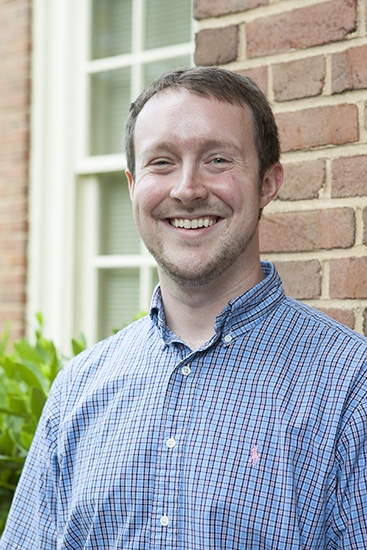
Position: Assistant Professor of Music and Coordinator of Music Theory, Composition, and Musicology Studies
Teaching at Samford since 2012
Bonus Fact: Dr. Davis was in the second cohort of the prestigious Lilly Fellows Graduate Program while he earned his graduate degrees from Claremont Graduate University in California
Why do you teach at Samford? I consider it a privilege to teach at Samford. As a Samford alumnus (2005), I am particularly grateful to serve alongside the faculty and staff who mentored and influenced me during my own undergraduate years. I teach because I love working with the students who come here, and I sincerely enjoy getting to know them as fellow travelers in the ongoing journey of faith and learning. I find it extremely fulfilling to play a small role in the formation of my students’ character, intellect, artistry and identity over the course of their collegiate years.
What is one thing you want your students to know when they graduate from Samford? By the time my students graduate from Samford, I want them to realize that they are the “music makers” and “dreamers of dreams” that the poet Arthur O’Shaughnessy describes in his poem “Ode.” Regardless of whether they pursue graduate studies or professional opportunities in the arts, these young people will continue to take part in a story (or symphony, if you will) that is greater than themselves. I hope my students will take the time to stop, look and listen with a sense of wonder and concern for this world, and I pray that they will perform their roles with excellence.
What is your favorite non-Samford activity? Why? My favorite non-Samford activity would have to be spending time in the company of my wife, Lauren Heerssen Davis (B.S.’05, Nutrition and Dietetics) and our daughter, Ansley Kate. They both fill my life with an incredible amount of joy, laughter and beauty.
How did your background prepare you for your current role at Samford? I believe that my background as a Samford alum has been particularly helpful in terms of how I relate to my students: I know what it feels like to be in their shoes, and I can remember experiencing many of the same emotions, struggles and triumphs they are currently navigating. Similarly, I feel that my connection to Samford’s recent past provides me with a deeper understanding of this institution and its history. On a different note, my time away from Samford has also prepared me well for my role as a member of the composition faculty. From my graduate studies and previous teaching posts to my work on film scores and concert hall premieres, my professional experiences have equipped me for the work that I do with our students on a daily basis.
How did you become involved in composing film scores and what is a favorite project you have done or are doing? I got my start composing film scores back in 2009, when a college classmate of my mother’s asked me to write the original music for her PBS documentary Mississippi ReMixed. I thoroughly enjoyed the collaborative and creative aspects of the project, and it was very gratifying to see our work receive placement in international film festivals and national television broadcasts. Thankfully, I have had the good fortune to continue to work on numerous film scoring projects ever since. My most recent film score is for Theatrical Distances, a collaborative hybrid chamber composition/short film that features the work of the talented local filmmaker and Samford alumnus T. W. Ballew (B.M. ‘14, Music).
What’s one thing that most students do not know about you? Most students do not know that I had originally planned to be an English major. I decided to pursue a music degree after enrolling in an AP music theory course at my high school, and I even considered majoring in such subject areas as music therapy and commercial music before matriculating into Samford as a church music major. It wasn’t until halfway through my first semester of freshman year that I finalized my decision to study music theory and composition. Around that same time, instructor Jeff Northrup asked me if I had ever considered a career in teaching, and the rest, as they say, is history!
How do you use your composition and performing talents in the local church? From a young age, I have been mentored and shaped by musicians who serve in the local church. Upon returning to Birmingham to begin my faculty appointment at Samford, I joined the staff at Shades Mountain Baptist Church as a part-time worship associate in instrumental music. I direct the Shades Orchestra and serve as an instrumentalist in the worship band. I thoroughly enjoy my interactions with the faithful volunteers who offer their gifts to this ministry. I have also been privileged to partner with Shades for reading/recording sessions of my students’ arranging and orchestration projects, several of which have been subsequently performed in worship services and community concerts.
